|
|
|
Sort Order |
|
|
|
Items / Page
|
|
|
|
|
|
|
| Srl | Item |
| 1 |
ID:
064862
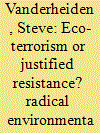

|
|
|
| 2 |
ID:
178647
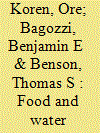

|
|
|
|
|
| Summary/Abstract |
Research often fails to account for the specific pathways by which climatic factors can cause social unrest. One challenge lies in understanding the distinct effects of food insecurity and water insecurity – which we term ‘staple insecurities’ – while accounting for their interrelated nature, especially at high-resolution spatio-temporal scales. To unpack these dynamics, we leverage geolocated Twitter data across urban areas in Kenya and deploy a supervised machine learning approach to separately identify geolocated tweets concerning food and water insecurity, in both English and Swahili. The data are then aggregated to create daily measures of food and water insecurity for standardized grid-cells to examine how perceived food insecurity moderates and/or reinforces perceived water insecurity’s impacts on social unrest, and vice versa. Our findings suggest that food and water insecurities’ respective effects should be interpreted as mutually reinforcing – in compelling citizens to take to the streets – rather than as independent. Those concerned with climate change’s impact on conflict should hence endeavor to jointly account for both forms of insecurity, and their interactive effects.
|
|
|
|
|
|
|
|
|
|
|
|
|
|
|
|
| 3 |
ID:
175474
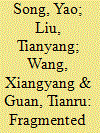

|
|
|
|
|
| Summary/Abstract |
While most scholars agree that China’s central authorities are no longer the sole actors controlling socio-political life in the country, few have paid adequate attention to the proactive role of China’s grassroots actors, especially during critical public crises. During the 2020 Covid-19 outbreak, Chinese society was fragmented in its response. Rural authorities imposed capricious and uneven restrictions, and civil disobedience among urban residents assumed myriad guises. The degree to which state directives on virus control were implemented within rural China depended on two factors: individual villages’ social structures, and how effectively political pressures were channeled from the top down. Furthermore, quarantined residents in urban areas should not be understood as passive victims, but rather as active subjects, whose diverse manifestations of civil disobedience during the crisis posed a challenge to the effectiveness of official restriction policies.
|
|
|
|
|
|
|
|
|
|
|
|
|
|
|
|
| 4 |
ID:
130791
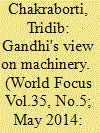

|
|
|
|
|
| Publication |
2014.
|
| Summary/Abstract |
Mahatma Gandhi held a distinctive place in the history of Indian freedom movement as well as in the
momentous evolution from tradition to modernity. During the time-period ranging from l9l6 to 1947,
Gandhi had revealed his luminous dexterity and methods which made him the vanguard of the nation,
by the relentless logic of history. He was an iconoclast. Who quivered the basics of the powerful British Empire in India through multiple novel means such as non- violent, satyagraha, . Fasting, hartals, non'-cooperation and mass civil disobedience. Gandhi was a multifaceted virtuoso who applied his mind to glitches of human distress. His social ideas amply exhibited a deep and abiding consciousness of the fundamental reformation of the Indian society. In the economic sphere, he ardently believed that the economic salvation of India exclusively depended on the economic regeneration of vast millions of Indians living in the rural areas. ln line with such a policy. he championed the promotion of small scale village and cottage industries, which could offer productive employment on a long-term basis to the common masses of India. At the political level, Gandhi felt that the state was a means of intimidation, since it was likely to demoralize the cherished essential freedom of individuals. As an individualist, Gandhi judged that individuals could enhance their traits through truth and non-violence, drenched with an ambience of freedom.
|
|
|
|
|
|
|
|
|
|
|
|
|
|
|
|
| 5 |
ID:
133544
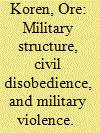

|
|
|
|
|
| Publication |
2014.
|
| Summary/Abstract |
In this article, I argue that factors inherent to the structure of a military organization and their relationship with the political leadership play a role in the organization's tendency to perpetrate violence against civilians during civil disobedience campaigns. To examine this hypothesis, I conducted a three-phased statistical analysis on a database containing 97 campaigns that took place between 1972 and 2012. In the first phase, I examined the relationship between military centric factors and violent crackdowns. In the second phase, I examined the relationship between military centric factors and mass killing. In the third stage, I examined the relationship between two specific types of discrimination in the military and mass killing. I found strong evidence supporting the hypothesis mentioned above. High-risk militaries that served a militarized regime, contained loosely regulated or indoctrinated paramilitaries, and discriminated against the protesting group, were much more likely to perpetrate violence against civilians during civil disobedience campaigns than low-risk militaries. The conclusions of this study suggest that further examination of the military's role in perpetrating violence against civilians during protests and conflict may provide some novel findings.
|
|
|
|
|
|
|
|
|
|
|
|
|
|
|
|
| 6 |
ID:
109940
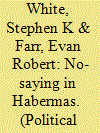

|
|
|
|
|
| Publication |
2012.
|
| Summary/Abstract |
Habermas's paradigm of communicative action is usually taken to be pretty much dominated by consensus, "Yes-saying." What if this were a radically one-sided perception? We take up this unorthodox position by arguing that "no-saying" in this paradigm is typically overlooked and underemphasized. To demonstrate this, we consider how negativity is figured at the most basic onto-ethical level in communicative action, as well as expressed in civil disobedience, a phenomenon to which Habermas assigns the remarkable role of "touchstone" (Prufstein) of constitutional democracy. Once the importance of no-saying is drawn out, the paradigm looks distinctly less hostile to dissensus and agonism in democratic life.
|
|
|
|
|
|
|
|
|
|
|
|
|
|
|
|
| 7 |
ID:
046654
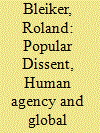

|
|
|
|
|
| Publication |
Cambridge, Cambridge University Press, 2000.
|
| Description |
289p.
|
| Standard Number |
0521778298
|
|
|
|
|
|
|
|
|
|
|
|
Copies: C:1/I:0,R:0,Q:0
Circulation
| Accession# | Call# | Current Location | Status | Policy | Location |
| 045850 | 303.61/BLE 045850 | Main | On Shelf | General | |
|
|
|
|
| 8 |
ID:
047080
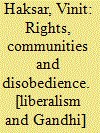

|
|
|
|
|
| Publication |
New Delhi, Oxford University Press, 2001.
|
| Description |
vi, 202p.
|
| Standard Number |
0195655133
|
|
|
|
|
|
|
|
|
|
|
|
Copies: C:1/I:0,R:0,Q:0
Circulation
| Accession# | Call# | Current Location | Status | Policy | Location |
| 044415 | 320.51/HAK 044415 | Main | On Shelf | General | |
|
|
|
|
| 9 |
ID:
129097
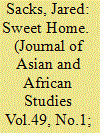

|
|
|
|
|
| Publication |
2014.
|
| Summary/Abstract |
For much of the winter of 2012, communities in shack settlements across Cape Town took to the streets in some of the most active civil disobedience protests since 1994. Knowing that the mainstream political terrain often seeks to obfuscate and mislead the public about the true nature of these protests, this paper investigates claims by politicians from the Democratic Alliance (DA) that these protests were being coordinated by the Youth League of the African National Congress (ANCYL). These big political players moralize the debate, shifting the focus from the perfectly legitimate issues of service delivery and demands for meaningful engagement. Speaking directly to community members of Sweet Home Farm, an informal settlement of 15,000 people in the Philippi area, revealed a yawning chasm between what official players are saying about Sweet Home and the actual realities on the ground.
|
|
|
|
|
|
|
|
|
|
|
|
|
|
|
|
| 10 |
ID:
174474
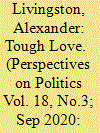

|
|
|
|
|
| Summary/Abstract |
Love is a key concept in the theory and history of civil disobedience yet it has been purposefully neglected in recent debates in political theory. Through an examination of Martin Luther King, Jr.’s paradoxical notion of “aggressive love,” I offer a critical interpretation of love as a key concept in a vernacular black political theology, and the consequences of love’s displacement by law in liberal theories of civil disobedience. The first section locates the origins of aggressive love in an earlier generation of black theologians who looked to India’s anticolonial struggle to reimagine the dignity of the oppressed as “creative survival.” The second contextualizes King’s early sermons on moral injury and self-respect within this tradition to reinterpret Stride toward Freedom’s account of the dignity-enhancing effects of nonviolent resistance as the triumph of love over fear. The third considers the implications of these arguments for conceptualizing the moral psychology of the white citizen and its consequences for contemporary debates over the ideological uses of Civil Rights history. The call to respond to oppression with aggressive love illustrates the paradoxical character of civil disobedience obscured by legal accounts as well as by criticisms of the very idea of “civil” disobedience. This is the paradox of affirming civility while enacting disobedience in order to bind political confrontation with political pedagogy.
|
|
|
|
|
|
|
|
|
|
|
|
|
|
|
|
|
|
|
|
|